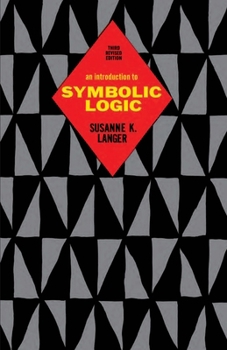An Introduction to Symbolic Logic
Select Format
Select Condition 
Book Overview
Famous classic has introduced countless readers to symbolic logic with its thorough and precise exposition. Starts with simple symbols and conventions and concludes with the Boole-Schroeder and Russell-Whitehead systems. No special knowledge of mathematics necessary. "One of the clearest and simplest introductions to a subject which is very much alive." - Mathematics Gazette.
Format:Paperback
Language:English
ISBN:0486601641
ISBN13:9780486601649
Release Date:January 1967
Publisher:Dover Publications
Length:384 Pages
Weight:0.86 lbs.
Dimensions:0.7" x 5.4" x 8.1"
Customer Reviews
5 ratings
High Marks for Clarity, Good for Self-Tutorial - Offers Historical Perspective
Published by Thriftbooks.com User , 19 years ago
An Introduction to Symbolic Logic by Susanne K. Langer is quite useful for self-tutorial purposes. The author's informal, wordy, enthusiastic, narrative style is quite engaging, and should appeal to readers new to this topic. Her explanations are detailed and carefully constructed. However, Langer's classic text is now rather dated; her first edition (1937) is credited with being the first introductory level text on symbolic logic. The second (1953) and third (1967) editions offer new prefaces, updated reading lists, and expanded appendices, but are not dramatically changed. The third edition (1967) is still available in an inexpensive Dover reprint. Symbolic logic was a young discipline when Langer was writing her first edition. The classic work of Boole, De Morgan, Schroeder, Peano, and Frege had all occurred in previous seven decades. Not everyone agreed, but many logicians still viewed Whitehead and Russell's monumental Principia Mathematica (1910-1913) as the detailed reduction of all of mathematics to logic. Susanne Langer's personal choice of some symbols now seems idiosyncratic, but to be fair it should be noted that even today's textbooks have yet to agree fully on a standard set of logic symbols. What really dates Langer's text is her effusive admiration for the "logistic masterpiece" of Whitehead and Russell. Not surprisingly, her text culminates, after much preparation, in two final chapters devoted to Principia Mathematica and logistics. Reading Langer is like reading history. (And I for one do enjoy reading classic mathematical texts, monographs, and papers.) Langer's early chapters include the essentials of logical structures, generalization, classes, principal relations among classes, and the universe of classes. The latter half is more challenging with chapters titled The Deductive System of Classes, The Algebra of Logic, Abstraction and Interpretation, The Calculus of Propositions, and of course, The Assumptions of Principia Mathematica. Readers already familiar with the fundamentals of symbolic logic might skip the early chapters. Langer made no mention of Godel's incompleteness theorem despite its direct reference to Russell and Whitehead's work. Godel's classic 1931 paper was titled "On formally undecidable propositions of Principia Mathematica and other related systems". Perhaps, Godel's work was judged too technical for an introductory text. My review refers to the second edition of An Introduction to Symbolic Logic. My 1953 soft cover Dover edition, a library discard, is still in surprisingly good condition.
Very clear introduction to a difficult subject
Published by Thriftbooks.com User , 20 years ago
Symbolic Logic can be a very daunting study, even to those already familiar with traditional Aristotelian logic. Langer's book, however, makes symbolic logic comprehensible to the average educated person, so that the array of logical symbols and mathematical formulae employed in symbolic logic seem not so intimidating after all. Clarity of presentation is this book's chief virtue. Admittedly, it is a bit dated, but for someone approaching the study of symbolic logic for the first time, it cannot be surpassed. It would make a suitable textbook for an introductory course in Logic, perhaps in combination with Mary Michael Spangler's "Logic: An Aristotelian Approach" (a good choice for traditional deductive logic).
Outstanding introduction
Published by Thriftbooks.com User , 23 years ago
This is a great introduction. It progresses clearly so you can always understand the new stuff in terms of the previous stuff.
Langer triumphs
Published by Thriftbooks.com User , 24 years ago
This is the book that introduced me to logic. It enthused me so much that I became a professional logician, a career that I have pursued for 35 years. Langer points out that, once one becomes acquainted with modern symbolic logic, one can go on to do groundbreaking research. This is true.
Excellent introduction
Published by Thriftbooks.com User , 25 years ago
A truly wonderful introduction to symbolic logic. One of the best. It covers boolean algebra, propositional calculus, and Russell and Whitehead's logistic.A charming and delightful book.





